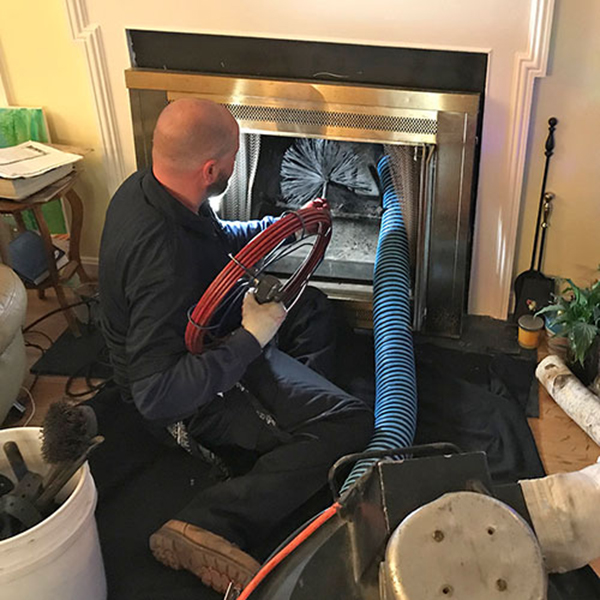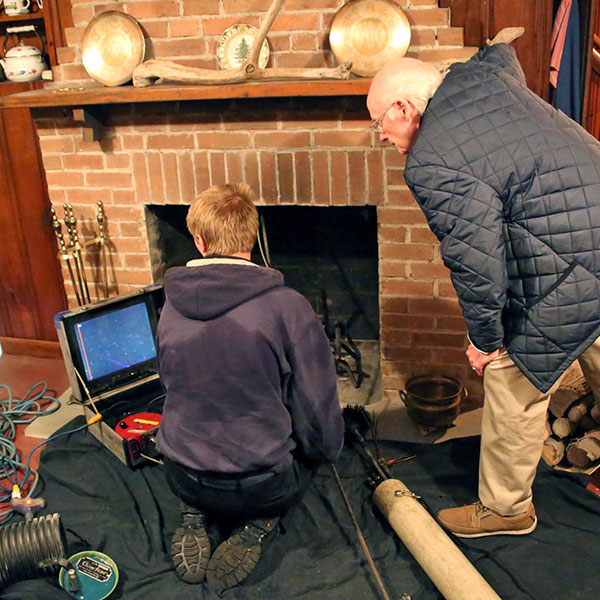What’s Causing My Chimney To Smell?
Fireplace smells and chimney odor problems can be attributed to a handful of different things. The root cause of the majority of fireplace smells, however, is creosote deposits—a natural byproduct of burning wood—inside your chimney. The odors are usually worse in the summer when the humidity is high, on rainy days, and/or when your air conditioner is running. Our trained chimney sweep can help minimize your fireplace and chimney odors, thereby improving your home’s air quality in the process.
 The Hidden Source of Your Chimney Odors
The Hidden Source of Your Chimney Odors
Believe it or not, even after having your chimney professionally swept, you can still have odor issues. Creosote absorbs into the porous masonry construction inside your chimney, embedding the fireplace smell deep beyond the masonry’s surface. A chimney sweep will remove the surface buildup of creosote to limit the possibility of a chimney fire; however, the odors that have absorbed into the masonry itself will remain. The key now is to simply keep the unpleasant odors from entering your living spaces.
Draft Issues Bring the Smell In
The smell is brought to your attention as a result of air coming down the chimney, a symptom of overall pressure and draft problems.
Normally, as long as the draft is working correctly and there is no negative airflow in the home, the smells will remain inside the chimney. In the event that negative airflow becomes a problem, however, the air brings the inner fireplace smells and chimney odors right along with it as it exits vacates the chimney and fireplace and enters your living space. A quick solution to the negative air pressure is to simply keep a window cracked at all times to enable the pressure to change through the window rather than the chimney, ultimately keeping the odors locked away inside your chimney and away from your nose.
Sealing Out the Smell
 For a more permanent approach to keeping the smell that’s exuding from your fireplace and chimney’s masonry away from your nose, you need to limit the amount of air that’s able to come down your chimney in the first place. Closing your throat-mount damper is a good start, however, the metal-on-metal closure here is far from airtight. A top-sealing damper can help to minimize the airflow and reduce the accompanying fireplace smells significant, if not altogether. In addition to taking care of your airflow problems, a top-sealing damper will help keep rainwater and moisture out of your chimney, too. There’s never a bad time to schedule a chimney inspection. Chimney sweeps are available year-round to inspect and clean your chimney. Don’t allow these unpleasant smells to become a problem in your home. As soon as you notice them coming from your fireplace, contact the chimney professionals at Above and Beyond Chimney Service.
For a more permanent approach to keeping the smell that’s exuding from your fireplace and chimney’s masonry away from your nose, you need to limit the amount of air that’s able to come down your chimney in the first place. Closing your throat-mount damper is a good start, however, the metal-on-metal closure here is far from airtight. A top-sealing damper can help to minimize the airflow and reduce the accompanying fireplace smells significant, if not altogether. In addition to taking care of your airflow problems, a top-sealing damper will help keep rainwater and moisture out of your chimney, too. There’s never a bad time to schedule a chimney inspection. Chimney sweeps are available year-round to inspect and clean your chimney. Don’t allow these unpleasant smells to become a problem in your home. As soon as you notice them coming from your fireplace, contact the chimney professionals at Above and Beyond Chimney Service.
We strive to both exceed your expectations on every level and make your chimney and vent maintenance services as painless and convenient as possible.
